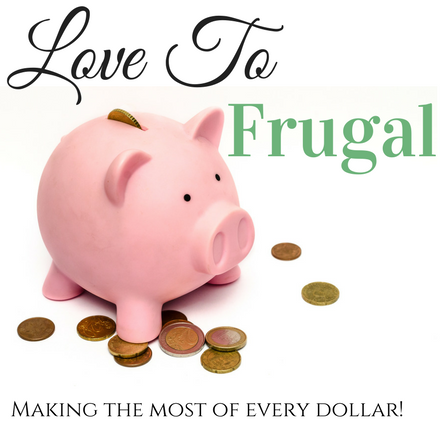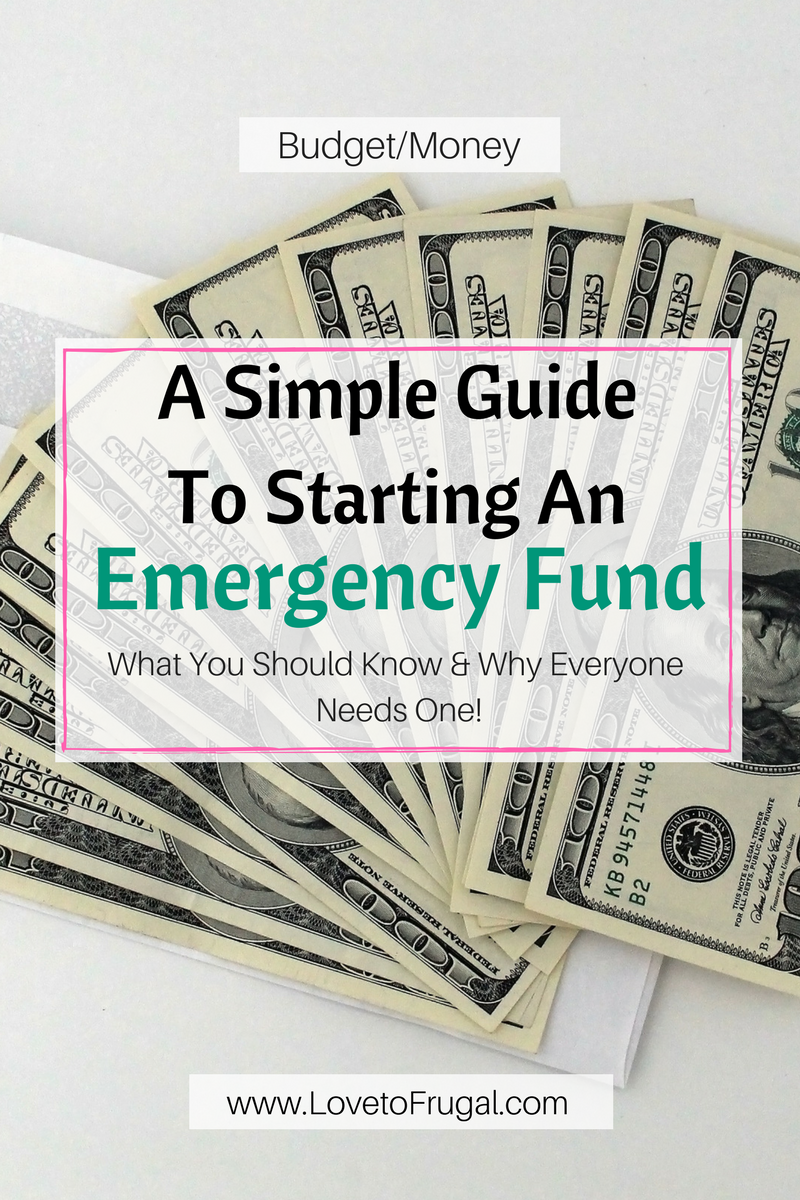A Simple Guide to Starting An Emergency Fund
I think everyone would agree that life sometimes doesn’t go as planned. That’s just life…right? Well, when life happens, it’s nice to have a little buffer between you and circumstances. And what may that be, you ask? It’s called an emergency fund! Everyone on the planet needs one. You’re here, reading this post, so therefore, I can only assume you have a few questions. Well, speaking from experience, I’ll be happy to tell you what everybody ought to know about emergency funds.
I’ll try to answer some basic questions about them and how important it is to have one.

What is An Emergency Fund?
Simply put, an emergency fund is money that is set aside in a separate account or place that may be needed in the event of a financial dilemma. It’s for the surprises that may be thrown your way. Having one can literally turn a crisis into an inconvenience.
Who Needs One?
Like I stated above, everyone on the planet needs one. It doesn’t matter if you make $10,000 or $510,000 a year, life happens to all of us.
Wealthy people aren’t immune to unexpected life events any more than the rest of us. Granted, their funds may need to be larger, due to having more or higher monthly expenses.
Everyone from college kids to CEO’s need to have money put aside for these curveballs that life can and often does throw at us.
Why Do You Need One?
I think the biggest reason for having an emergency fund is to help you stay out of debt or keep from going deeper into debt. If you have ever listened to Dave Ramsey, the first step of his 7 baby steps is to find $1,000 fast. This is that buffer between you and life. It’s not step #2. It’s step #1 and that’s for a reason.
According to a January, 2019 survey from Bankrate.com, only 40% of Americans could cover a $1,000 emergency like a car repair or an emergency room visit. What’s even worse, is that one in three American families have no savings at all. That is amazing and quite a sobering statistic.
What Is It Used For?
There’s a big difference between a true emergency and an expense that simply catches you off guard. Some of the most common emergencies that people face are:
*Job loss
*Medical emergencies
*Unexpected home repairs
*Car troubles
*Unplanned travel expense
*A sudden death
These are just to name a few, but you get the idea.
Expenses that are NOT emergencies would be:
*Christmas-It comes the same time, every year.
*Property taxes-You know you have to pay them even though the amount may be unpredictable, so budgeting a little every month would come in handy here.
*Income taxes-May or maybe not be predictable. You should definitely set some aside for this expense.
*Car registration
*Birthday or anniversary gifts
These are just to name a few. Even with expenses that you might deem an emergency, like car repairs, you should probably have an envelope or a portion of savings ear marked for this type of situation. Let’s face it, cars break down, need tune ups, batteries, tires, etc. I have a car repair envelope that I actually put money into every pay day. And I’m so glad I have, as we drive older (paid for) cars and there’s always something that we need to do and pay for. It’s still cheaper than having a monthly car payment.
How Big Should It Be?
Well, I’m going to refer back to Mr. Ramsey again. If you’re trying to get out of debt, start with $1,000. Work your debt snowball. Once you are out of debt, build your emergency fund to 3 to 6 months of monthly expenses.
It’s very important to sit down and write out your monthly expenses. Write out everything that you can think of that you spend money on each month, then you need to determine what is necessary and what could be cut. The most important expenses you have when facing say, a job loss, would be food, utilities, mortgage/rent and transportation. With these four things taken care of, you live to fight another day.
Next, you start weeding out the unecessaries. Do you need cable tv? No! Do you your nails done every 2 weeks? No! Do you need to go out to eat every Friday night? No! Human beings really don’t “need” much, even though some husbands think they can’t live without ESPN. Trust me…they can.
You need to decide what’s enough for you and your family. If you have an unpredictable income or you don’t feel that you have enough job security, you may want to err on the side of caution and go with 5-6 months worth.
Also, the amounts might differ, depending on the is size of your family. For instance, if you’re single, your monthly expenses may be lower than someone who is married with a couple of kids, but if your obligations are more, you may also want to save closer to the 6 month mark.
Bottom line is something is better than nothing. You can start small, but the important thing is to just start.
How Do You Build An Emergency Fund Quickly?
Building an emergency fund is not as hard as you might think. If you need to build one quickly, here are some quick ideas to get you started:
Do a house purge!
AKA…declutter! Sell some stuff on Craigslist or have the mother of all garage sales. In our consumer driven society, we all have so much stuff just sitting around. How much of it is actually needed or being used?
Ditch the cable/satellite!
The average bill is at least $100/month. Opt for antenna. It’s a one time purchase and installation…then it’s FREE! Another way is to opt for no tv at all! We watch YouTube more than anything, these days.
Automate your savings!
You can actually set up a payroll deduction for this or you can have your bank do it once your paycheck hits the bank, then just have it transferred to another (savings) account.
Adjust your withholdings
If you usually get a large refund, you may be having too much taken out of your paycheck. That’s like giving Uncle Sam an interest free loan! Once you correct this, put the extra money that you’ll be getting on your paycheck directly into a savings account. You’ll never miss it!
Redeem rewards
If you have a credit card with cash back rewards, you can cash those out and have the money deposited to your emergency savings account.
shop & compare
Shop different insurance companies for lower rates on your car insurance or homeowners insurance.
Negotiate With Cell phone provider
Call your cell phone provider and see if there’s any way they can lower your monthly bill.
Cut food spending
Meal plan and make a grocery list. Food is one of our biggest monthly expenses and there are many ways to cut in this department by simply pre-planning our meals and shopping, accordingly. If you frequently eat out, try cutting out fast food or restaurants and take what you would’ve spent and throw it into savings.
Adjust your thermostat down in the Winter and up in the Summer.
This can save you bunches!
Cancel unnecessary memberships and subscriptions.
Get a part time job!
This will do wonders for building your emergency fund and increasing your income not only will help to build savings, but it will also expedite the debt snowball. Get creative!
Where Should You Put It?
Your emergency fund should be liquid or easy to get to. It is NOT an investment. Money market funds are a safe place for your money. They are safe from risk, they’re easily accessible and they do earn a tiny bit of interest.
The other option is a plain, old savings account. Banks will usually let you have more than one savings account and if you prefer, separate it from your other accounts and only use it for emergencies.
What Are the Benefits of Having One?
Oh my goodness!! Let me count the ways! Emergency funds are like having insurance against life! When you have money saved for life’s little inconveniences, you have peace of mind and when you have peace of mind, you have less stress in your life! Period!
An emergency fund protects you from going deeper into debt. See above paragraph! Get it? If you are in debt, an emergency fund is the first step to help you crawl out of that hole, known as debt. For me and my family, it was a turning point in our lives when we were finally able to get to a point where we weren’t in crisis every time we had to pay an unexpected medical bill or like the time when my schnauzer got into the trash on Christmas day and made herself sick eating turkey skin! That was quite an unexpected vet bill, but having the cash instead of putting it on a credit card was such a relief. She was ok…thank goodness and so were my finances.
The bottom line…
Save as much as you can, as soon as you can. Set up a saving plan now, before a crisis hits and you are panicked and pressed for time. It will give you financial peace so you can enjoy your life and your family no matter what life throws at you!
If you need help with starting a budget, be sure to read 8 Simple Steps For Setting Up A Budget and if you have already tried doing a budget, but are having a hard time with having enough money to get you through payday, check out How To Use The Half Payment Method. This method of budgeting literally changed our lives.
What are some creative ways you have built your emergency fund? I would love to hear from you.
PS…Be sure to subscribe to Love To Frugal so you don’t miss a thing!




One Comment